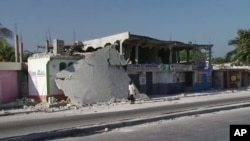On Monday, international donors gathered in Montreal to confer on rebuilding Haiti and agreed on a 10-year rebuilding plan that the Haitian government said would cost $3 billion. We went to the city of Carrefour, outside of Port-au-Prince. Carrefour was the epicenter of the earthquake. We asked residents what they think about reconstruction.
France Joseph is lucky to be alive. He lives in Carrefour, the epicenter of the earthquake that reduced much of Haiti to rubble. He was in downtown Port-au-Prince on business when the first tremors hit. When he returned home, he found most of his neighborhood leveled, his modest house in ruins. "I am empty handed. I have nowhere to go," he said.
Carrefour means crossroads. The city, near the sea, got its name from the dozen roads that intersect here. It's fitting given that France Joseph and other residents of Carrefour are also at a crossroads. They must decide whether to stay and rebuild their community or move on. Iloisel Jose, who lives in the U.S. part of the year says he's not sure. "If you are the guy to be living 25, 30, 40 years to build one house. You gone in one second, no money now, no job, how them going to build. You can't do it again," he said.
Lazarre Vereau is standing next to what is left of his drugstore. He is combing through the rubble, salvaging whatever personal belongings he can find. He doesn't think he will rebuild right away. "I am going to watch everyone else first. When somebody else starts to rebuild, then I will follow," he said.
There is no question Carrefour will need outside help.
When we asked Saint Croix Fils, president of the local Rotary Club, about Carrefour's predicament, he offered a word of caution with this Haitian proverb: a goat with too many masters dies in the sun.
Haiti, he said, has had too many masters, too many international organizations promising big things but not delivering.
He wants one organization, one donor country, to focus on Carrefour, and see it through to the end.




